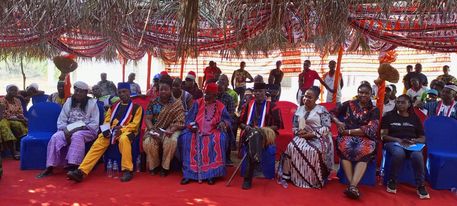MONROVIA, LIBERIA-In 2012, the United Nations General Assembly designated February 6th each year as the International Day of Zero Tolerance for Female Genital Mutilation, with the aim to amplify and direct the efforts on the elimination of this practice.
On the heels of commemorating the day on Monday, February 6, 2023, a famous “Bush School” which has existed many years practicing FGM in Sonkai Town, Todee District, Rural Montserrado County, has been closed.
The program, on the closure rituals of initiation without mutilation on FGM took place on Friday, January 20, 2023.
It was organized by Liberia’s National Council of Chiefs and Elders, in collaboration with the Ministries of Gender, Children and Social Protection, Internal Affairs and UN Women Goodwill Ambassador, Jaha Dukureh whose organization, Safe Hands For Girls, is being supported by international organization Equality Now.
The elaborate program was witnessed by scores of government officials, traditional chiefs and elders, FGM activists, including representatives from the international organization Equality Now and the Press.
National Traditional Chiefs and Elders Council Chairman, Chief Zanzan Kawor, remarked that the traditional Sande bush school remains a place of training and discipline, and not a place where young girls are spoiled to disrespect their fathers and mothers.
“I represent my chiefs, the indigenous people of the Republic of Liberia. Coming here is a message I brought for you all. People, talking about Sande, Sande are the area for you to train your child to respect the father and mother. This is the area our daughters come from and do not disrespect their mothers and fathers”.
Chief Zanzan Kawor’s remarks followed the official turning over of “zoes bundles” containing tools and instruments that have been used over the existence of the Sonkai Town Bush School to effect “cutting”.
During her turning over remarks, Liberia Chief Female Zoe, Massa Kandakai, explicitly reminded Government and International Partners, including UN Women, that their livelihoods are tied to the practice.
Therefore, the abolition of “Bush Schools” must be carefully looked into and replaced with something sustainable.
“You tell me say put the dried dog on the drier but what I will be eating? We need to talk more but I will tell your thank you for coming and looking on that side of our concerns”, Madam Kandakai expressed.
Similar statement, apparently, demanding money for the end of the practice was condemned by the Monrovia Feminist Study Circle as a condition for ending Female Genital Mutilation (FGM).
Assistant Internal Affairs Minister for Culture, Joseph Jangar, who represented Internal Affairs Minister Varney A. Sirleaf, said traditional leaders in Liberia will continue to enjoy the support of the Ministry with the closure of bush schools, a no exception.
Gender, Children and Social Protection Minister, Williametta Saydee-Tarr, described the program as a milestone in the advocacy against Female Genital Mutilation, while referencing the emotional moment for traditional leaders who have carried on the practice for years.
Minister Saydee-Tarr thanked Chief Zanzan Kawor for the effort exerted to get where Government and partners have reached in their effort to abolish FGM in the Country.
News of the closure of rituals of initiation without FGM in Liberia has been welcomed internationally.
Judy Gitau, Regional Coordinator for Africa (Equality Now) is quoted as saying “This is a welcome step. Civil Society Organizations have continuously raised concerns about the harmful effects of Female Genital Mutilation. FGM causes girls and women life-long physical and psychological trauma, including depression. FGM is a human rights violation. However, it is deeply entrenched within the Liberian culture and the move by traditional leaders to abandon FGM as a practice in totality is a clear annotation of their recognition that FGM, indeed, has detrimental effects on young women and girls.”
Since its founding in 1992, Equality Now has been using a unique combination of legal advocacy, regional partnership-building and community mobilization to encourage governments to adopt, improve and enforce laws that protect and promote the human rights of women and girls around the world. With an international team, our campaigns are centered on four program areas: Legal Equality, End Sexual Violence, End Harmful Practices, and End Sexual Exploitation, with a cross-cutting focus on the unique needs of adolescent girls.
The establishment of Sande and Poro groups in Liberia dates as far back as to the days was there was no constitutional government.
FGM is a human right abuse that continues to affect the lives of millions of women and girls around the world. The World Bank estimates that as of 2020, Liberia had a prevalence rate of 31.8%.
Although Liberia is party to a number of international and regional human rights conventions and protocols calling for the protection of women and girls from FGM, such as the Maputo Protocol, which in Article 5 calls explicitly on State Parties to ban all forms of FGM through legislative measures, which Liberia ratified in 2008, the country does not have a law prohibiting FGM for all ages.

